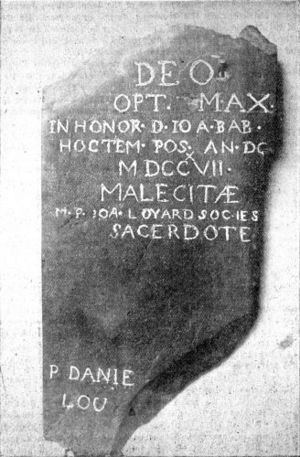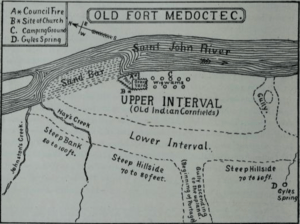Meductic Indian Village / Fort Meductic facts for kids
Quick facts for kids Fort Meductic |
|
|---|---|
| near the confluence of the Eel River and Saint John River, in New Brunswick, | |

Meductic Church Cornerstone (1717). Oldest Christian religious artifact in New Brunswick. Discovered 1890.
|
|
| Site information | |
| Controlled by | Maliseet |
| Site history | |
| Built | before the 17th century, first fort in Acadia |
| Battles/wars | Battle of Fort Loyal |
| Official name: Meductic Indian Village / Fort Meductic National Historic Site | |
| Designated: | 1924 |
Meductic Indian Village / Fort Meductic was a very important village for the Maliseet people. It was also known as Medoctec, or Mehtawtik, which means "the end of the path." This village was located in New Brunswick, near where the Eel River meets the Saint John River. Today, this spot is about four miles upriver from the modern town of Meductic.
Meductic was the main village for the Maliseet First Nation for a long time. It was important even before the 1600s and stayed that way until the mid-1700s. It was also a key place for the fur trade, where people exchanged animal furs for other goods.
Contents
What Was Fort Meductic?
The village of Meductic had its own fort, called Fort Meductic. The Maliseet people built this fort a long time ago, even before the French arrived in the area. They built it to protect themselves from attacks by the Mohawk. The Mohawk were part of a powerful group called the Iroquois Confederacy, who lived in what is now New York.
The First Fort in Acadia
Historians believe that Fort Meductic was the very first fort built in a region known as Acadia. Acadia was a French colony in North America that included parts of what is now eastern Canada and the northeastern United States.
French Influence and the Chapel
The French wanted to have a good relationship with the Maliseet people at Meductic. In 1701, a priest named Father Joseph Aubery helped restart a religious mission there.
Building Saint Jean Baptiste Chapel
Later, in 1717, another priest named Jean-Baptiste Loyard built a chapel called Saint Jean Baptiste in the village. This was done to strengthen the French connection with the Maliseet. King Louis XV of France even gave a bell for the chapel!
Meductic Today: A Historic Site
The area where Meductic village and Fort Meductic once stood is now a special place. It is recognized as a National Historic Site. This means it's an important historical location for all of Canada.
Remembering the Past
A special plaque from the Historic Sites and Monuments Board was placed on a stone marker near the site. This plaque helps people remember the history of Fort Meductic. The official recognition covers the area where archaeologists have found remains of the old village and fort.
The Meductic-Eel River Portage
Another important part of this area's history is the Meductic-Eel River Portage. This was a route used to travel between Acadia and New England. It was so important that it was named a National Historic Event in 1943. The French often used this route when they went on expeditions against the English.
 | Selma Burke |
 | Pauline Powell Burns |
 | Frederick J. Brown |
 | Robert Blackburn |


